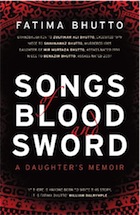
Over the past four decades, the name Bhutto has come to symbolize -- depending on which version of history you believe -- Pakistan. It has become our lot in life to obsess over the Bhuttos, discuss their macabre deaths -- Zulfikar was hanged, Shah Nawaz poisoned, Murtaza and Benazir shot -- and wonder how many more Bhuttos will come to rule over Pakistan.
The latest author to chronicle the Bhuttos is Fatima Bhutto, Murtaza's daughter and the much-fawned over columnist and poet whose book, Songs of Blood and Sword: A Daughter's Memoir, was recently released in Pakistan, India, and the United Kingdom. Songs of Blood and Sword is Fatima's attempt at writing a memoir of her father, Mir Murtaza Bhutto, who died in 1996 when the Karachi police fired on his convoy while his sister, Benazir Bhutto, was prime minister.
On first read, this memoir often feels like a rehash of Daughter of the East, Benazir Bhutto's 1988 autobiography that documented her life in prison under General Zia ul-Haq's regime and the events that preceded it, including her father being hanged by Haq's administration, simply because Fatima is as defensive of Zulfikar Ali Bhutto's domestic and foreign policies as Benazir was.
But Fatima Bhutto's grief is palpable on every page -- anyone who has lost a parent can empathize with her pain, and anyone who hasn't will still commiserate. But in her attempt to document her father's life from his birth to his years in exile in Syria from the early 1980s and eventual return to Pakistan in 1993, Fatima tries to wipe the slate clean and goes down the same route that Benazir did in Daughter of the East: selectively using quotes from those who agree with her worldview.
Fatima traces Murtaza's history and finds witty gems and beautiful ex-girlfriends as she travels to Boston and Athens to discover her father's life. She finds professors reminiscing about their talented young student, and old friends sharing anecdotes and letters written by Zulfikar to Murtaza.
She writes at length about their shared memories, their bond as father and daughter, strengthened further by the fact that he brought her up almost single-handedly, since her parents divorced shortly after Shah Nawaz Bhutto's death. Fatima's account of their life in Damascus is poignant, peppered with their shared interests, anecdotes of Murtaza's boisterous sense of humor and conversations about life and love. These parts are engaging, make for a compelling read and deserve to be documented. He writes a poem to her in a letter while he was in jail, excerpted here:
Here is a small one on Wadi [Benazir] and Slippery Joe [presumably Asif Ali Zardari, Benazir's husband]
Inky, Pinky, Ponky
Her husband is a donkey
Both loot the country
Her husband is a monkey
Inky, Pinky, Ponky.
Fatima also paints a chilling narrative of the night Murtaza was shot dead along with several of his supporters, an account that explains why this book is laden with not-so-quiet rage. In the epilogue, she writes of an occasion when President Asif Ali Zardari and his entourage were being received at the British consulate, close to Fatima's residence, as she stood at the same spot her father had been shot. "Here I was, standing where my father was murdered, and the man who I believe was in part responsible for the execution was across the road from me, being received diplomatically. I felt my knees buckle. I sat down on the curb."
She transports the reader back to the streets of Karachi and the frenzied scenes in the hospital where doctors tried to save Murtaza's life. It is the story of yet another Bhutto trying to come to terms with yet another strange and unexpected death, the fourth in as many decades. These are the losses that have shaped Pakistan's history to a great extent and will be an influential factor for the foreseeable future.
But given that this is a grieving daughter's memoir of her father who was killed at the young age of 42, it is clear that she does not intend to criticize his actions in any way. Fatima Bhutto glosses over the time he spent in Libya as a guest of Colonel Gaddafi or in Kabul, as the alleged head of the Al-Zulfikar Organization (AZO) that was set up to avenge the death of Zulfikar Ali Bhutto. Unsurprisingly, Murtaza is absolved of all responsibility for AZO. The famed 1981 hijacking of a Pakistan International Airlines plane in Kabul that AZO took credit for is explained differently. Fatima quotes a friend of Murtaza's extensively, who claims that the hijacker, Salamullah Tipu, was not a member of the AZO and that Murtaza was actually negotiating with the hijackers to release the women and children on board. It is an account that is widely disputed by former members of the AZO (Raja Anwar, The Terrorist Prince, 1997).
But in this new episode in the saga of the Bhutto dynasty that Fatima has chronicled, the blame -- as well as the acerbic barbs and the retorts -- are all directed at her aunt Benazir Bhutto. Fatima criticizes Benazir from her choice of room décor at the Bhuttos' Karachi residence to Benazir's decision to wear a head scarf and her wit -- anecdotes all dissected to form a portrayal of a self-centered, power-hungry woman who Fatima squarely holds responsible for everything that has gone wrong in the Bhutto dynasty.
In her quest to absolve Murtaza of lingering criticism surrounding his name and paint Benazir as the "bad guy," Fatima blames her aunt for everything from Murtaza's incarceration after he returned from exile, to alienating Nusrat Bhutto, Benazir's mother and Fatima's grandmother, from the PPP and being hungry for power. She does share anecdotes of her memories with her aunt, but writes that "since we returned to Pakisan I had seen a different, ugly side of my aunt," citing an incident where Fatima asked her to visit Murtaza in jail with her and Benazir refused, saying "I couldn't get permission from the jail to come." Fatima couldn't fathom this, given that Benazir was prime minister at the time, and writes, "I couldn't shift the blame from her any more. She was involved. She was running the show." The final blow came after Murtaza's death, when Benazir reportedly called his widow, Ghinwa, a ‘bellydancer' from the ‘backwoods of Lebanon.' Fatima writes, "After Papa was killed, I never saw that old Wadi again. She was gone."
In her quest though, Fatima even attempts to hold Benazir responsible for the death of Shah Nawaz, Benazir and Murtaza's brother, who died under rather strange circumstances in France in 1985. (While the Bhutto family was on holiday in Cannes, where Shah Nawaz lived with his wife and daughter, they was alerted by his wife one morning that Shah Nawaz had "taken something" (p.250, Daughter of the East). They discovered he was dead, allegedly having taken poison, but the Bhutto family believes he was murdered while his wife was charged (and then cleared) of not assisting Shah Nawaz in time.) Her source? The observations of the lawyer Murtaza and Benazir engaged to fight the case in French courts, Jacques Verges. The insinuation that Benazir may have ordered Shah Nawaz's killing and the remarks she chooses to include by Benazir (such as indulgent postcards she sent to Murtaza at university) sour the book. It no longer feels like a memoir, but yet another blame game in the history of the Bhutto family that is still at odds with each other. Their conflict shows no signs of dissipating or staying within the family. Last week, Zulfikar Ali Bhutto's nephew Tariq Islam sent a letter to the Dawn newspaper disputing at least one account in Songs of Blood and Sword by quoting conversations he had with Zulfikar before Zulfikar was executed in 1979.
Fatima Bhutto's rage at Benazir, who she believes was either involved in or complicit in covering up the killing of her father, Murtaza -- the woman she once thought of as her favorite aunt -- is understandable. But it is a niece's anger, not a historian's or a memoirist's.
Songs of Blood and Sword is not, and should not be treated as, a chapter in the Bhuttos' history. It is a self-serving charade discounting other versions or characters because they do not fit with Fatima's take on events that occurred in Murtaza's life.
The book has reportedly sold well in Pakistan (Express Tribune), but the reviews in the Pakistani press have been rather scathing (The News, Dawn, Express Tribune). It is hard to gauge Pakistani public approval or disapproval of the book, given that Fatima Bhutto flew out of Pakistan for a book tour after it launched and has reportedly refused to sit down for face-to-face interviews with Pakistani journalists. Conventional readings and Q&A sessions would have given insights, but this is no conventional book. It will continue to sell well -- anything with the Bhutto name does -- but whether it can spark any negative public reaction to Fatima or Zardari remains to be seen.
Ultimately, Songs of Blood and Sword is yet another in the series of books written by the Bhuttos about their versions of history as they see it. Mark your calendars: 22 years from now, another Bhutto will be penning a memoir. As Tariq Islam says Zulfikar Ali Bhutto told him in jail, "I will go down in history. Songs will be written about me." He probably didn't expect the songs would be written by members of his own family.
Source: http://afpak.foreignpolicy.com/posts/2010/04/26/the_bhuttos_and_their_books





















